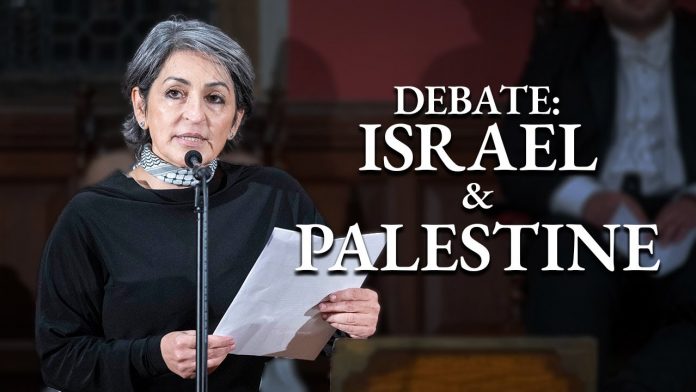Few Western voices have braved the gates of Gaza during Israel’s ongoing military assault. Fewer still have returned to tell the story. Susan Abulhawa, a Palestinian-American writer and humanitarian, is one of them.
In this sobering episode of “The Watchdog,” Abulhawa sits down with host Lowkey to describe the irreversible psychological toll of witnessing Israel’s war on Gaza from inside the Strip and the political price of telling the truth in the West.
“I wish I never left,” she says, recounting her time in Gaza earlier this year. “I left thinking I was going to come back in a couple of months to resupply and bring back in medicines and supplies.” But after Israeli forces seized the Rafah border crossing, she found herself unable to return. “They’re in complete control at this point.”
What she saw, she says, changed her life forever. Even in a small corner of Gaza and during a short window of time, the totality of the devastation overwhelmed her. “It has honestly changed my life in a way that is sometimes difficult to put into words,” she says.
The terror that Israel has brought to Gaza is in every corner. It’s behind every tree. There are no trees left, actually. It’s very few. You feel the breath of death everywhere.”
From hospitals full of orphaned newborns to makeshift shelters packed with hundreds sharing a single bathroom, Abulhawa says she encountered levels of desperation she had never imagined.
People who were one day planning to go to college, planning to get married, thinking about starting a business, expecting a baby… were the next day trying to figure out where to get bread, how to get clean water, where to go to the bathroom.”
She describes the situation in Gaza as “layer upon layer upon layer of depravity, of inhumanity, of the worst human impulses you can imagine.” And she emphasizes that the war’s brutality extends beyond bombs. “Israel targets our children,” she says, citing testimonies from Israeli soldiers, patterns of bombing schools, and systematic trauma inflicted on minors.
 A longtime voice for Palestinian liberation, Abulhawa is best known for her international bestseller, “Mornings in Jenin” and is the founder of Playgrounds for Palestine, a nonprofit that supports children’s rights in occupied territories.
A longtime voice for Palestinian liberation, Abulhawa is best known for her international bestseller, “Mornings in Jenin” and is the founder of Playgrounds for Palestine, a nonprofit that supports children’s rights in occupied territories.
For Abulhawa, returning to the West came with its own risks. Her testimony has drawn ire from pro-Israel groups, media censors, and even so-called allies in progressive spaces. Speaking out about what she saw, she says, often results in being smeared as antisemitic or dismissed as biased, despite the overwhelming evidence of war crimes and ethnic cleansing.
Her speech at the Oxford Union went viral, garnering hundreds of thousands of views in just a few days, only to be quietly censored and edited without her consent. The parts removed included factual references to historical Zionist terrorism, such as the use of booby-trapped toys against Lebanese children, and direct criticisms of Zionism. She describes the censorship as both an assault on her freedom of expression and a form of discrimination against her beliefs.
“There was an agreement that none of my speech would be edited,” she says, noting that she had submitted a written rider to that effect. “They still did it.”
Abulhawa also addresses how nature itself is being targeted in Gaza. She mourns the loss of wildlife, trees, and even insects. “Species are going extinct right now because of this,” she says, describing how Gaza was once an important migratory stop for birds between Africa and Europe.
Reflecting on the rising tide of direct action across the globe, Abulhawa praises the efforts of Palestine Action in the UK, calling their work “the best of humanity.” She criticizes institutional NGOs that oppose or condemn such tactics, arguing that street protests alone do little to disrupt the machinery of genocide. “Unless we can find a way to be a threat to them, nothing is going to change,” she says.
Abulhawa sees this moment as not just a political crisis, but a civilizational reckoning. She warns that future generations will judge us harshly for how we responded, or failed to respond, to Gaza’s cries for help.
“This war isn’t just destroying Gaza,” she says. “It’s dismantling our shared sense of humanity.”
Truth Has Enemies. We Have You.
For over a decade, MintPress News has been at the forefront of exposing Israeli apartheid, occupation, and war crimes—when few dared to. We’ve been censored, smeared, and blacklisted for telling the truth. But we haven’t stopped.
Independent journalism like this isn’t just important, it’s under attack. If you believe in reporting that defends the voiceless and challenges the powerful, we need your support.
Lowkey is a British-Iraqi hip-hop artist, academic and political campaigner. As a musician, he has collaborated with the Arctic Monkeys, Wretch 32, Immortal Technique and Akala. He is a patron of Stop The War Coalition, the Racial Justice Network and The Peace and Justice Project, founded by Jeremy Corbyn. He has spoken and performed on platforms from the Oxford Union to the Royal Albert Hall and Glastonbury. His latest album, Soundtrack To The Struggle 2, featured Noam Chomsky and Frankie Boyle and has been streamed millions of times.
The post Susan Abulhawa: Censored at Oxford After Witnessing Gaza Genocide appeared first on MintPress News.
